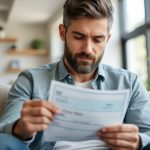Uh-oh. Out of nowhere, you were just in a car wreck. Now what? First, it doesn’t matter if you are at fault or not; the rules are the same whether you are simply sitting at a stoplight thinking about what you’re going to have for dinner and some knucklehead rear-ends you, or whether you’re the knucklehead who is reaching over to find that perfect Liberace song on your iPod and you rear-end somebody sitting at a stoplight.
Most important: Don’t run away. Although runners are usually the at-fault party, we have seen victims of auto accidents run away, too. If you flee an auto accident, whether or not you are at fault, this is called hit-and-run. Hit-and-run is a very big criminal deal and will completely ruin your world for a very long time if you are caught. Stay and face the music. It’s better than warrants for arrest, cop helicopters, and officers knocking down the front door while you try to squeeze out the bathroom window. If you run, once they finally catch you living in a cardboard box in your aunt’s garage, you may be fined, sent to jail, or both. You also could lose your license. Try explaining all of that to your mom.
You should also exchange information with the other driver. At this point, tempers are probably running high, so avoid confrontation. If it looks like things are going to get ugly, just bag the interaction with the other driver, call the police, and wait for them to show. If you do exchange information, it should include names and driver’s license numbers, the vehicle identification numbers of the cars involved in the accident, the name and address of the cars’ owners, and the name and address of the insurance company and insurance policy number if you have them. In Washington, all drivers are supposed to carry proof of insurance, so the insurance information should be available at the scene.
If you hit a parked car or other property, try to find the owner or driver. If you can’t, drive away only after you leave behind, in a conspicuous place, your name, address, and an explanation of the accident, and the name and address of your car’s owner if it is not you.
Should you always call the police? In Washington, you don’t have to. If the apparent vehicle damage was over $500.00, you do have to file a report with the police within four days of the accident. These days, it costs more than $500.00 to buff out a grill, so just about any puny accident may require a report. However, it may be a good idea to call the police anyway, especially if you are the victim. That way, you have a police report, complete with little drawings and diagrams of the scene, that establishes liability for the accident. Be sure to take down the officer’s name and badge number. Also, these days, most people have cameras in their cell phones, so it’s a good idea to take pictures of the accident scene, the vehicles, the damage, and the wild-eyed other driver chasing you with a tire iron while you try to climb a tree.
What if there are injuries? If someone was injured, you must render reasonable assistance. If someone is badly injured, including yourself, call 911 immediately, giving a full description of the scene, the injuries, and the address - and don’t hang up until the operator tells you it’s okay. If you don’t have a cell phone, flag down a passing car if needed. If you are not trained in emergency first aid procedures, do not move someone who is badly hurt; you might make the injury worse. However, if you can do so, you should move someone who is in danger of being hurt worse or killed (for example, someone trapped in a car that is sliding off a cliff, or if a car is on fire) even if you do make the injury worse. You’ll also get all kinds of good karma and maybe a special certificate from the mayor and a medal or something for these kind of rescues, which is always nice.
To help prevent additional collisions, try to warn other motorists that an accident has occurred. If there are no flammable items nearby, placing flares on the road or turning on your car’s hazard lights, and lifting the engine hood are usually good ways to warn others on the road. Don’t panic.
Another thing - if there are witnesses to the accident, be sure to get their names, addresses, and telephone numbers. Ask them to stay to talk to the police if possible. If they insist on leaving, ask them to tell you what they saw and write everything down. Also, try to identify people at the accident scene, even if they will not give their names. For example, if someone who saw the accident drives off, take down his or her license plate number.
If you really want to be thorough and you are a closet artist, draw a simple diagram of the accident. Draw the positions of both cars before, during and after the accident. Pace off any skid marks to the accident, and draw them on the diagram, noting the distance they cover. Mark the positions of any crosswalks, stop signs, traffic lights or streetlights. Note the weather and road conditions, and the time of day of the accident and how well lighted is accident area.
Even though you are going to be tempted to stand around and blab about your version of the accident, don’t volunteer any information about who was to blame for the accident. You may think you are in the wrong and then learn that the other driver is as much or more to blame than you are. Wait until you talk to your insurance agent, your lawyer or both. When talking to the police, cooperate, but stick to the facts. Anything you say to the police or the other driver can be used against you later, including admissions that you didn’t sleep at all the previous night or that the kids in the back seat were screaming their lungs out while they were dodging a swat from you while you were driving. And don’t agree to pay for damages or sign any paper except a traffic ticket until you check with your insurance company or lawyer.
If you get a ticket, sign it. A ticket has nothing to do with your guilt or innocence; when you sign it, you are only promising to either appear in court to contest the ticket, or to pay it later if you wish. If you do not sign the ticket, the police officer haul you off, which is never good. While it is okay to sign the ticket, talk with your lawyer before you pay a fine or plead guilty to the charges. Find out what your options are.
After the accident, a checkup may be a good idea for both you and your passengers if any of you have concerns about your health. It is not unusual to be injured and not know it right away. You may wish to call your doctor or another health care provider for advice. Your automobile insurance may pay some or all of these health care bills. You should consult your policy or agent for details on what is covered. Also, don’t give a recorded statement or settle with an insurance company and sign a release until you speak to counsel. Know your rights and what you are giving up before you settle a case with an insurance.
If you follow the above tips, you will do better than the vast majority of those in car accidents. Auto accidents, of course, can have serious consequences, and the statute of limitations on accidents is generally three years - which is a long time to worry about getting sued. So drive defensively, and be careful out there.
Whether you’re at fault or not, it’s almost smart to contact an attorney as soon as possible for advice and guidance.



